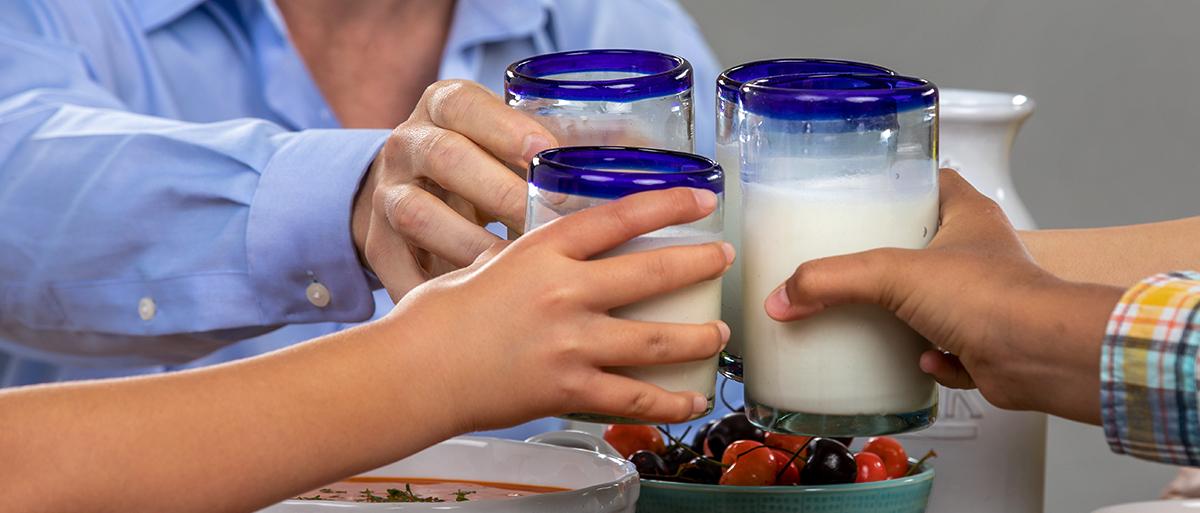In fact, 54 million Americans, half of all adults 50 and older, are at risk for fractures from osteoporosis and low bone mass, according to the National Osteoporosis Foundation.
Half. That’s a pretty staggering number. Want to know how you can prevent it from happening to you?
Calcium is the answer. About 99% of the calcium in your body is stored in your bones, keeping them strong. Overwhelming scientific evidence indicates that eating the right amount of calcium throughout your life may delay or minimize bone loss and decrease the risk for osteoporosis.
- 68 out of 70 randomized, controlled intervention studies demonstrated that calcium intake increases bone gain during growth, reduces bone loss with age, and reduces fracture risk.
- More than three-quarters of 110 observational studies supported calcium’s beneficial role in bone health.
Dairy provides nearly 75% of the calcium available in the food supply. Dairy is also an excellent source of several other essential nutrients that work together to help protect bones, including magnesium, phosphorus, potassium, protein and vitamin D.
That means three servings of milk, cheese and yogurt per day can help reduce your risk of osteoporosis later in life. It’s especially important for children and young adults to consume enough calcium, as they are still building bones mass and establishing lifelong healthy eating habits.
How Much Calcium Do You Need?
|
AGE |
DAILY CALCIUM RECOMMENDATION |
DAILY DAIRY SERVINGS RECOMMENDATION |
|
Infants 7-12 months |
260 mg |
small amounts of yogurt and cheese, depending on developmental readiness |
|
Children 1-3 years |
700 mg |
1.5 servings for toddlers 12 to 23 months, 2 servings for those 2 years of age, 2.5 servings for those 3 years of age ------------------------------------------- 2 glasses of milk = 610 mg of calcium |
|
Children 4-8 years |
1,000 mg |
2.5 servings ------------------------------------------- 2.5 glasses of milk = 762.5 mg of calcium |
|
Adults and Children 9 years and up |
1,000 - 1,300 mg |
3 servings ------------------------------------------- 3 glasses of milk = 915 mg of calcium |
Do I Still Need Calcium as an Adult?
Yes. Though your body stops adding new bone after about age 30, it continues to use the calcium stored in your bones to slow age-related bone loss.
That means your bones are constantly being broken down and rebuilt as you age. If you don’t replenish that calcium, you could end up with weak, porous bones and eventually osteoporosis – even if you had healthy bones as a kid. So make sure you still get your three servings every day, whether it’s milk, cheese, yogurt, cottage cheese, or the occasional ice cream cone.
--
References:
Miller, G.D., J.K. Jarvis, and L.D. McBean. Handbook of Dairy Foods and Nutrition. Boca Raton, FL: CRC Press, 3rd edition. 2007, pp.181-244.
Cashman, K.D. Milk minerals (including trace elements) and bone health. Int. Dairy J. 16: 1389-1398, 2006.
Heaney, R.P. Calcium, dairy products, and osteoporosis. J. Am. Coll. Nutr. 19(suppl): 83s-99s, 2000.
Heaney, R.P. The importance of calcium intake for lifelong skeletal health. Calcif. Tissue Int. 70: 70-73, 2002.
National Institutes of Health: https://ods.od.nih.gov/factsheets/Calcium-Consumer/
2020-2025 Dietary Guidelines for Americans: https://www.dietaryguidelines.gov/




